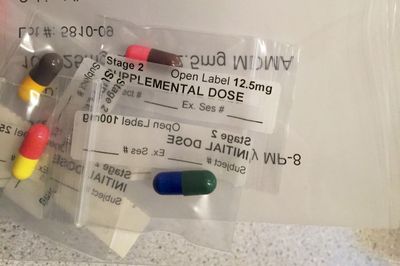Among the most frustrating aspects of post-traumatic stress disorder (PTSD) is the poor recovery rate of those who suffer, often for years or even decades.
The Department of Veterans Affairs -- VA -- has approved several methods of treating the stubborn, disabling psychological and physiological symptoms of the usually invisible war wound, but none of the various tactics has proven particularly effective. The journal Pharmacy & Therapeutics has reported that nearly nine out of 10 veterans treated for PTSD are given one or more drugs in a class known as selective serotonin reuptake inhibitors, better known by brand names such as Prozac, Paxil or Zoloft.
A wide array of those and other prescription drugs are frequently tried in combination "cocktails" because symptoms and results vary widely. Antidepressants and anti-anxiety medications may be used along with antipsychotics, painkillers, sleeping pills, stimulants or tranquilizers to help troubled veterans struggling to control their mood swings, anger, hyper-vigilance, chronic pain, panic attacks and a raft of complications that can make life a nightmare for them and those around them. Psychotherapy, individually or with groups of similarly disabled veterans, is offered, as well as a newer treatment known as Eye Movement Desensitization and Reprocessing (EMDR), which can sometimes break the link between memories of the traumatic event and the brain's abnormal response to those memories.
Unfortunately, the treatments often help little, if at all. The most promising drugs are said to produce complete remission in perhaps 20 to 30 percent of cases -- if that. Dr. Charles W. Hoge, a leading researcher in treatment of PTSD and traumatic brain injury, has written that accepted treatments fail as often as they succeed.
What's more, of course, desperately unhappy vets may turn to alcohol, illegal street drugs, marijuana and other substances to dull their pain. Alarming numbers commit suicide. And then there are hundreds of thousands, perhaps millions, who suffer without ever being diagnosed.
On this Veterans Day in 2015, the vets who served in Vietnam came home more than 40 years ago; those from the first Gulf War have been back almost a quarter century. And American troops are still deployed in combat zones like Afghanistan. For all of those who have struggled with PTSD afterward, a cure is long overdue.
The good news is that there is hope.
Serious scientific research is finally yielding some remarkable results with a long-banned substance that is being used in combination with limited, one-to-one psychotherapy in officially sanctioned clinical trials. While it is necessary to be cautious when reporting results of small-scale tests, anecdotal reports from trials with combat veterans diagnosed with PTSD indicate that the use of a pill to alter the mind during a few supervised, professional therapy sessions can actually cure some patients of their PTSD with results lasting at least years after the therapy.
The substance is known as MDMA, the initials of a nearly unpronounceable psychedelic chemical: 3,4-methylenedioxymethamphetamine. In the 1970s and early '80s, MDMA was used by some psychiatrists as a psychotherapeutic tool to treat various mental illnesses, although it was never approved for such uses. It also became popular on the street as a legal but unauthorized party drug known as "ecstasy" or "molly" that acted as an hallucinogen and stimulant.
In 1984, during a surge in the "drug war," the Drug Enforcement Administration announced plans to ban the sale or use of MDMA as a dangerous, potentially addictive drug in the same category as heroin. Illegal and uncontrolled varieties of ecstasy and molly have remained on the street but frequently contain other chemicals that may change its psychotropic effects. Physicians and medical researchers convinced of MDMA's potential benefits won approval from the Food and Drug Administration in 2001 to begin the long, measured process of studying the risks and benefits of MDMA in scientifically controlled environments.
This week, the Multidisciplinary Association for Psychedelic Studies (MAPS), an umbrella organization sponsoring the tests, reported that Phase 2 of the FDA-required three-step process will be complete in a few months, and large-scale trials of the drug in humans should begin next year. The group's goal is to complete the laborious process and win approval of MDMA as a prescription generic drug by 2021. Meanwhile, more veterans and others who have suffered after traumatic events such as rape will be eligible for participation in the studies.
The great sadness is that political forces and the DEA's approach to dealing with a perceived threat stalled meaningful study of the drug for 17 years while millions suffered and many died.
___________________
If you -- or someone you know -- need help, please call 1-800-273-8255 for the National Suicide Prevention Lifeline. If you are outside of the U.S., please visit the International Association for Suicide Prevention for a database of international resources.
For more information on mental health support for veterans, visit http://www.mentalhealth.va.gov/
